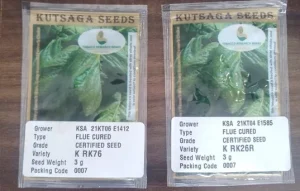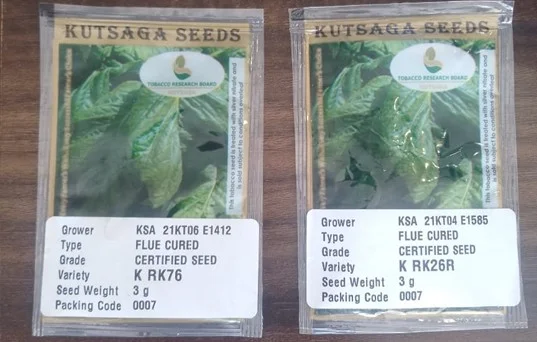
Selecting the right variety of tobacco seeds is crucial for successful and profitable tobacco production. Therefore, the choice of variety should be made carefully, as it significantly impacts the economic viability of production. The tobacco seed variety chosen by a grower substantially influences the ability to produce the desired leaf styles and quality in the industry. Furthermore, selecting tobacco seed varieties plays a vital role in ensuring seed integrity, a key component of the Sustainable Tobacco Program (STP) and Good Agriculture Practices (GAP). Therefore, growers should make this choice meticulously to support their tobacco production’s overall success and sustainability.
To ensure the integrity of tobacco seeds, Shasha Tobacco requires all contracted growers to exclusively use certified, thoroughly tested, and verified seeds. Certified tobacco seeds undergo rigorous testing for genetic uniformity, purity, and viability, and their phenotypic traits are well-documented. Moreover, detailed information about the origins of the seeds is available, aiding in the selection of the appropriate variety. Currently, in Zimbabwe, certified tobacco seeds are sourced solely from Kutsaga Seeds and the Zimbabwe Tobacco Seed Association (ZTSA), the two authorized local producers of tobacco seeds.
Tobacco seed from Kutsaga Seeds, Varieties KRK76 and KRK26R
Shasha Tobacco provides certified tobacco seeds sourced from Kutsaga Seeds and encourages contracted farmers to acquire tobacco seeds from Kutsaga Seed or the Zimbabwe Tobacco Seed Association (ZTSA). Shasha Tobacco carefully selects tobacco seeds based on various factors such as agronomic traits, disease resistance, tolerance, and the specific tobacco growing area. The company offers high-yielding tobacco varieties with excellent agronomic traits, strong disease resistance, and tolerance, resulting in high-quality leaf styles. Additionally, for slow tobacco-growing areas, Shasha Tobacco provides fast-maturing varieties, while for fast-growing areas, it offers slow-maturing varieties.
Shasha Tobacco seedbed inputs disbursement in Hurungwe for the 2024/25 season
Tobacco seed integrity in Zimbabwe faces a current threat from the unauthorized importation of tobacco seeds from neighbouring tobacco-growing countries, particularly Zambia. Referred to as ‘kamuZambia,’ these seeds are gaining popularity in Zimbabwe with unverified claims of high yields. The use of these foreign seeds has notably increased in various tobacco-growing regions in recent seasons. However, the specific varieties, agronomic traits, disease resistance, and tolerance characteristics of these imported tobacco seeds are unknown. This presents a significant concern for seed integrity and sustainability of tobacco production in Zimbabwe.
It is reported that farmers who cultivate illegal foreign-sourced tobacco seeds often leave some tobacco plants after harvesting, allowing them to flower and produce seeds. These seeds are then harvested and used as retained seeds. To make matters worse, some farmers are also harvesting retained seeds for sale to other farmers. This has led to the emergence of illegal seed markets within tobacco-growing areas, where retained seed illegal foreign-sourced tobacco is being sold at varying prices based on the perceived demand in each location.
The presence of illicitly obtained foreign tobacco seeds not only jeopardizes the genetic purity and integrity of tobacco seeds but also presents a significant risk of genetic pollution within the tobacco production process. These unauthorized seeds carry an unknown genetic makeup, and their use compromises the genetic integrity of crops. Furthermore, the introduction of illicit foreign tobacco seeds raises concerns about the potential outbreak of diseases within tobacco production. The disease resistance and tolerance properties of these seeds are uncertain, increasing the likelihood of disease susceptibility and potential outbreaks. Given that these illicit foreign seeds are not specifically tailored to local environmental conditions, they may underperform in local climates, resulting in reduced yields and substandard-quality tobacco crops.
Shasha Tobacco vehemently opposes the practice of utilizing illicit foreign-origin tobacco seeds by Zimbabwean tobacco growers. The organization is steadfast in its dedication to upholding seed authenticity among its affiliated farmers and within the broader tobacco industry. Shasha Tobacco is taking proactive measures to combat the proliferation of illicit foreign-origin tobacco seeds among its contracted farmers. It ensures the distribution of certified tobacco seeds during the allocation of seedbed inputs to all contracted farmers to minimize the prevalence of illicit foreign-origin tobacco seeds. Moreover, the Shasha Tobacco agronomy team consistently conducts training sessions to raise awareness among farmers on the importance of preserving tobacco seed integrity and the risks associated with using illicit foreign-origin tobacco seeds.
The Shasha Tobacco agronomy team inspecting seedbeds in Mashonaland West province
The Shasha Tobacco agronomy team conducts regular visits to the seedbed sites of all contracted growers to closely monitor the seed varieties they are sowing. During these visits, the team also provides technical assistance on seedbed production and ensures that the proper seed varieties are being cultivated. Furthermore, the team diligently monitors the tobacco fields to ensure that no tobacco plants remain after the tobacco stalk destruction process, which could potentially be kept for harvesting retained seeds. This rigorous monitoring process aligns with Shasha Tobacco’s unwavering commitment to maintaining the integrity of tobacco seeds and its firm stance against the use of illicit foreign-sourced tobacco seeds. To further reinforce the integrity of tobacco seeds and promote sustainable tobacco production, Shasha Tobacco is open to collaborating with other stakeholders in the tobacco industry. This collaborative approach aims to enhance tobacco seed integrity through mutually beneficial partnerships and shared expertise.

